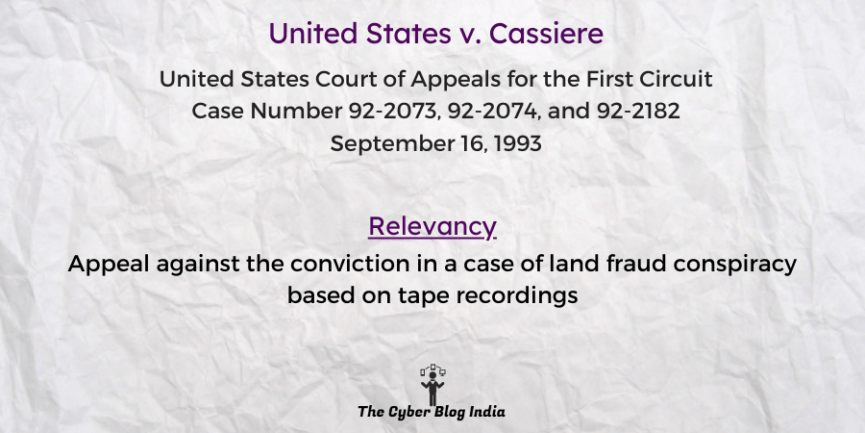United States v. Cassiere

United States v. Cassiere
4 F.3d 1006 : 39 Fed. R. Evid. Serv. 539
In the United States Court of Appeals for the First Circuit
Case Number 92-2073, 92-2074, and 92-2182
Before Senior Circuit Judge Friedman, Circuit Judge Selya, and Circuit Judge Cyr
Decided on September 16, 1993
Relevancy of the Case: Appeal against the conviction in a case of land fraud conspiracy based on tape recordings
Statutes and Provisions Involved
- The Wiretap Act, 18 U.S.C. §§ 2510-22
- The Wire Fraud Statute, 18 U.S.C. § 1343
- The Federal Rules of Evidence (Rule 404(b))
Relevant Facts of the Case
- Two of the defendants are a two-person law firm that handles land transaction closings. The other defendants are a real estate broker and a mortgage broker, respectively. All the defendants were involved in a scheme called ‘land flip’ that included purchasing property, reselling it, and using that money to finance the mortgage.
- The attorneys would participate in the closings, the real estate manager would provide the land, and the mortgage broker would provide the mortgage loan.
- The defendants used interstate wire communications to operate the scheme. A jury convicted all the defendants on counts of wire fraud and abetting wire fraud. The defendants have challenged the convictions on various grounds.
Prominent Arguments by the Counsels
- The defendants’ counsel did not deny the existence of the scheme to defraud but contended that they were unaware of it. The government had not proved the connection of the defendants with the scheme. The tape recordings went against the Wiretap Act, and their usage during the trial must have been suppressed.
- The appellee’s counsel submitted that the defendants knew about the scheme’s existence and were involved in it. They intended to defraud by participating in the scheme and making other pretences. They used interstate wire communications to execute the scheme.
Opinion of the Bench
- There was sufficient evidence to support the defendants’ involvement in the conspiracy. The prosecution had a proper foundation for the tape’s authenticity, and hence, its admissibility in the trial was not erroneous.
Final Decision
- The court held the District Court’s decision correct and made without error.
Arnav Kaman, an undergraduate student at Rajiv Gandhi National University of Law, Punjab, and Khilansha Mukhija, an undergraduate student at the Institute of Law, Nirma University Ahmedabad, prepared this case summary during their internship with The Cyber Blog India in January/February 2024.
